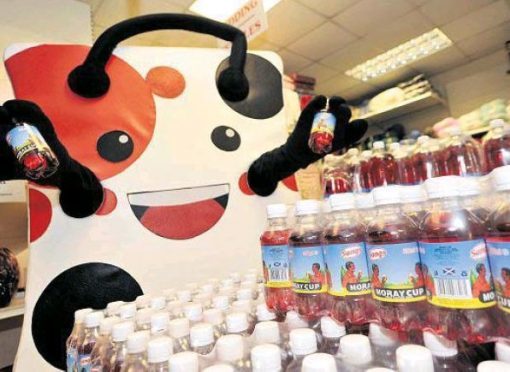A major drinks producer has announced it will no longer be making a north-east delicacy – just five years after a massive campaign helped save it from disappearing.
Moray Cup has been axed by Cott Beverages, with the American company blaming the UK Government’s impending sugar tax.
The drink, which was traditionally only available to purchase in parts of Moray and Aberdeenshire, has for years been drunk to wash down chip shop suppers or as part of a playground snack.
And now fans of the fizzy pop have taken to social media where a surge of interest has been generated to have the fruit-flavoured favourite return.
Des Cheyne, the owner of Banff’s Spotty Bag Shop, had been one of the drink’s major suppliers.
In 2012, when then producer Sangs went into administration, he bought thousands of bottles to help bolster the local production plant.
At the same time, more than 5,000 people signed up to a campaign to keep the brand alive.
It was eventually sold to Cotts and production continued.
Last night, Mr Cheyne said losing Moray Cup would be a “blow” to the north-east.
“In 2012 we took in bottles in support of the Moray Cup brand,” he said. “It now appears it’s the end of an era for a well-known product that has been around for ages.
“It was a popular product among children and adults alike, and it was one of our biggest sellers in the store.
“It’s a sad day for us as well, realising that the support we have given it has not been recognised by a corporate company.”
Yesterday, a spokesman for Cott Beverages blamed the tax – aimed at improving public health – and the cost of materials for the drink’s demise.
“We’re committed to ensuring that the Macduff production plant continues to be successful in light of the changing dynamics of the soft drinks industry, and as a result this means that we are having to make some difficult decisions,” he added.
“With the UK sugar tax approaching as well as the cost of materials, we have determined that we are no longer able to viably produce the Sangs Moray Cup range of drinks.
“We would like to thank our consumers for their loyalty. If at some point in the future circumstances change, then we will revisit our analysis on this range of products.”
The firm said no jobs would be lost.
A spokesman for the Save Moray Cup campaign, which was formed when the brand was first in trouble five years ago, said: “It’s sad news indeed.
“Hopefully the decision will be reversed in light of the outpouring of public support and we’ll continue drinking bottles of the fizzy stuff for years to come.”
THE HISTORY
Sangs was formed in 1896 and for years had sold fruit-flavoured drinks across the north-east.
The firm eventually moved to its home today, in Banff, in the 1970s and continued to prosper.
And with the popularity of its Moray Cup fizzy drink, gained a cult following in playgrounds and homes across the region.
At its peak, it is thought that the popularity of the product even rivaled Coca-Cola and Irn-Bru.
Alongside the red pop, Sangs sold Deveron Valley spring water, MacB flavoured water, Jet Pop and Justadash sugar free concentrates.
It was even the shirt sponsors of Partick Thistle Football Club.
But since a takeover in 2007, the firm has been plagued with troubles.
In 2012, 60 jobs were “put on the line” when the company was placed into administration by Allied Irish Bank which recalled all of its debts overnight.
The brand was sold as a result to US-firm Cott Beverages in March that year.
The sale secured all of the jobs at the Banff plant.
But the brand was back in the headlines this year when consumers started reporting that bottles of MacB strawberry and kiwi flavoured water “smelled like paint thinner”.
Cott had to issue safety advice concerning the batch before a full recall took place.
Now consumers are protesting the firm’s decision to pull one of its most recognisable products.
